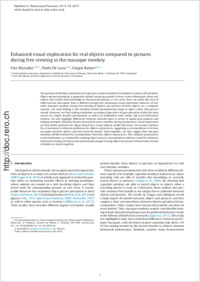Enhanced visual exploration for real objects compared to pictures during free viewing in the macaque monkey
- Mustafar, Faiz Visual Cognition Laboratory, Department of Medicine, University of Fribourg, Switzerland - Swiss Non-Human Primate Competence Center for Research, Switzerland
- Luna, Paolo De Visual Cognition Laboratory, Department of Medicine, University of Fribourg, Switzerland - Swiss Non-Human Primate Competence Center for Research, Switzerland
- Rainer, Gregor Visual Cognition Laboratory, Department of Medicine, University of Fribourg, Switzerland - Swiss Non-Human Primate Competence Center for Research, Switzerland
-
21.05.2015
Published in:
- Behavioural Processes. - 2015, vol. 118, p. 8–20
English
The question of whether animals perceive pictures as representation of real objects remains still unsolved. Object-picture perception is generally studied requiring animals to learn some information about real objects and transfer that knowledge to the pictorial domain, or vice versa. Here, we tackle the issue of object-picture perception from a different perspective, examining visual exploration behavior of two naïve macaque monkeys during free-viewing of objects and pictures of these objects on a computer monitor. Our main finding is that monkeys looked spontaneously longer at object rather than picture stimuli. However, we find striking similarities in temporal dynamics of gaze allocation within the time course of a single stimulus presentation, as well as in habituation rates within and across behavioral sessions. We also highlight differences between stimulus types in terms of spatial gaze patterns and looking strategies. Stimulus features that attract overt attention during spontaneous visual exploration are thus better predicted for object stimuli by a visual saliency model. Moreover, we provide evidence for a consistency in stimulus preference for objects and pictures, suggesting a correspondence of in how macaques perceive objects and their pictorial stimuli. Taken together, our data suggest that macaque monkeys exhibit evidence for correspondence between objects and pictures. This validates spontaneous visual exploration as a method for studying object-picture correspondence without a need for extensive behavioral training. We discuss the potential advantages of using object over picture stimuli in the context of studies on visual cognition.
- Faculty
- Faculté des sciences et de médecine
- Department
- Département de Médecine
- Language
-
- English
- Classification
- Biological sciences
- License
-
License undefined
- Identifiers
-
- RERO DOC 257286
- DOI 10.1016/j.beproc.2015.05.009
- Persistent URL
- https://folia.unifr.ch/unifr/documents/304523
Statistics
Document views: 126
File downloads:
- pdf: 275
